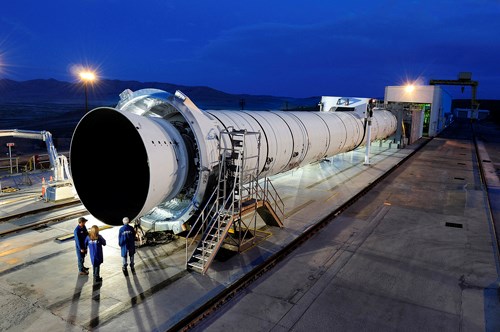Orbital-ATK marriage a sign of the times?
The merger of Orbital and ATK's Aerospace and Defense groups indicates that companies are positioning themselves to take advantage of the new public/private space market.

ATK Aerospace group launch vehicle structure.
It's hard to know yet how significant and how important the merger is of Orbital Sciences (Dulles, Va., USA) and ATK's (Arlington, Va., USA) Aerospace and Defense groups, but it's safe to say that it's pretty significant and pretty important to the space launch and exploration industries.
The space exploration industry, as many CW readers know, is in the early stages of substantial reorganization as NASA backs away from some of its traditional technology development work and toward integration of private companies that are or will provide everything from space vehicle launch systems to freight and human delivery craft.
In this early formative era, many companies are working hard to position themselves to supply many of the products and services required to deliver goods and people to the Internaitonal Space Station (ISS) and beyond. The union of Orbital and ATK, to be called Orbital ATK, appears to be one such move.
ATK is a major supplier of large composite structures to Boeing-Lockheed Martin joint venture United Launch Alliance (ULA, Centennial, Colo., USA) for the production of Atlas V and Delta IV launch systems, and it's possible that this relationship was attractive to Orbital. ULA received, on April 17, a "block buy" Evolved Expendable Launch Vehicle (EELV) contract from the U.S. Department of Defense (DoD) for 35 launch vehicle cores in a deal that, ULA says, saves the DoD about $4 billion.
Orbital, which manufactures launch systems of its own, had a filed a lawsuit against ULA in late 2013, arguing that ULA has violated the U.S. Sherman Antitrust Act. That suit was dropped in March, and now Orbital has a business relationship with ULA — via ATK — that might prove advantageous.
In the meantime, Elon Musk and SpaceX (Hawthorne, Calif., USA) are angling for a place at the launch vehicle table as well. SpaceX filed suit on April 25, arguing that the ULA EELV contract was granted on a "sole-source basis without competition from other launch providers. SpaceX is seeking the right to compete for some of these same launches."
"This exclusive deal unnecessarily costs U.S. taxpayers billions of dollars and defers meaningful free competition for years to come,” says Musk, SpaceX CEO and chief designer. “We are simply asking that SpaceX and any other qualified domestic launch providers be allowed to compete in the EELV program for any and all missions that they could launch.”
The upshot is that there is still a lot of dust to settle in the public/private space launch market. The next several months and years could prove enlightening about how this market will evolve.
Related Content
-
Composites manufacturing for general aviation aircraft
General aviation, certified and experimental, has increasingly embraced composites over the decades, a path further driven by leveraged innovation in materials and processes and the evolving AAM market.
-
Plant tour: Joby Aviation, Marina, Calif., U.S.
As the advanced air mobility market begins to take shape, market leader Joby Aviation works to industrialize composites manufacturing for its first-generation, composites-intensive, all-electric air taxi.
-
Combining multifunctional thermoplastic composites, additive manufacturing for next-gen airframe structures
The DOMMINIO project combines AFP with 3D printed gyroid cores, embedded SHM sensors and smart materials for induction-driven disassembly of parts at end of life.















